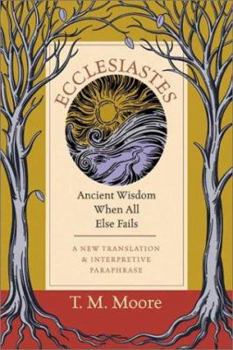Ecclesiastes: Ancient Wisdom When All Else Fails: A New Translation & Interpretive Paraphrase
Select Format
Select Condition 
Book Overview
T. M. Moore provides a new translation and interpretive paraphrase that artfully unveils the ancient mysteries of the often puzzling book of Ecclesiastes. This description may be from another edition of this product.
Format:Hardcover
Language:English
ISBN:0830821112
ISBN13:9780830821112
Release Date:January 2001
Publisher:InterVarsity Press
Length:139 Pages
Weight:0.80 lbs.
Dimensions:0.8" x 6.2" x 9.3"
Customer Reviews
2 ratings
A Good Study Guide
Published by Thriftbooks.com User , 22 years ago
T. M. Moore's new book on Ecclesiastes is a very attractive study guide. Its strengths are that it is a concise study that is formatted to a 13-week series replete with study questions for each chapter. The author has not only provided his own translation but includes his own interpretive paraphrase ajacent to the text. Its weaknesses are that due to format for study (with full footnoting included) it can be sheer tedium to read through the book in one sitting. In addition, perhaps an unintended oversight is found in the introduction where he claims the phrase "under the heavens" occurs only at 1:13 and 3:1. It also appears in 2:3. One last weakness is that, in order to set forth his own interpretive view of Ecclesiastes, his interpretive paraphrase is often too free with the original Hebrew text. However, I still recommend it at the introductory level as a resource for personal or group study.
Ecclesiastes: Ancient Wisdom When All Else Fails
Published by Thriftbooks.com User , 22 years ago
This little book by T.M. Moore is ideal for personal or small group study. It is one that I will use. Its format makes it ideal for study in that it is succinct and contains study questions for each chapter/lesson. It does have some weaknesses. Since both the translation and paraphrase are footnoted at the end of the text, it makes for lots of tedious flipping back and forth. As for authorship, his argument identifying Solomon as the author is not entirely convincing. His hermeneutic is based on a reading of the phrases "under the heavens" and "under the sun." Unlike, most commentators who view the two phrases as essentially saying the same thing, Moore argues instead that the former is used in contexts where "proper, heaven-oriented motivations, aspirations and conclusions are in view," whereas the latter "always occurs in a context marked by futility, frustration, vanity and 'chasing after the wind.'" While there may be something gained from such a interpretive strategy, he cites "under the heavens" as occuring only twice--in 1:13 and 3:1. For all of his years of teaching and research, how is it that he misses the same phrase in 2:3?







